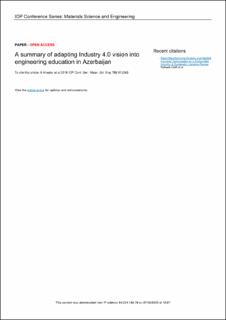| dc.description.abstract | Industry 4.0 vision and associated technologies are rapidly adopted in several industrial sectors to gain the benefits of creating smart cyber-physical systems and operations. Some sectors, e.g. manufacturing, oil and gas, offshore wind energy, have progressed in developing digitization strategies, executing pilot projects and progressing toward mature implementation of industry 4.0 vision. Offshore Oil and Gas industry highly believes in the potential industrial and societal impacts of digital transformation, due to the need for stochastic and remote operations. Azerbaijan as one of the countries that heavily depend on the Oil and Gas industry is developing more projects in the Caspian Sea. There are several worldwide challenges, mainly, lack of standards, business models, ready products/services and competent and skilled employees. Fortunately, specific developed countries are working hard to standardize industry 4.0 architecture. Moreover, large-scale companies are creating alliances to create a trustful and long-term business model. Furthermore, large-scale companies of information and operational technology are creating robust products and services to be commercially available off the shelf. In terms of education and training, many worldwide universities are upgrading their programs, curriculums, teaching approaches with the goal to support the industry with competent future employees and entrepreneurs. Therefore, the purpose of this paper is, to present the status of engineering education programs in adapting the industry 4.0 vision in Azerbaijan and address the skills that are required for future employment. In order to present the targeted status, the curriculums of all engineering education programs at the master level were collected and analyzed. However, five of them were directly adapting industry 4.0 vision and relevant for industry 4.0. Moreover, a semi-structured interview with industrial managers was applied to extract the future required skills. This study can be considered as a first step in developing a roadmap for engineering education, particularly industrial engineering, to adopt industry 4.0 vision at the national level. | en_US |

